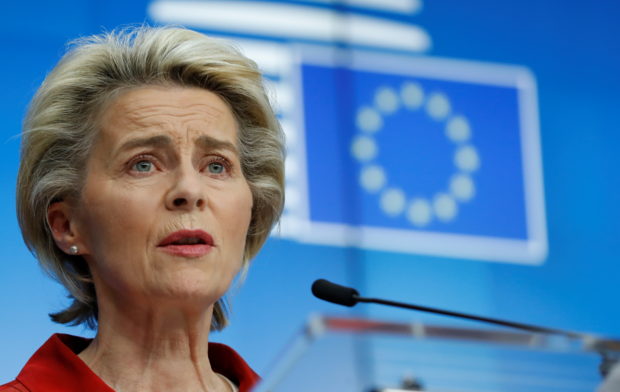
European Commission President Ursula Von Der Leyen gives a news briefing at the end of a virtual conference with EU leaders about EU government’s measures against the coronavirus disease (COVID19) crisis, in Brussels, Belgium, October 29, 2020. Olivier Hoslet/Pool via REUTERS
BRUSSELS — The European Union will finance the transfer of patients across borders within the bloc to prevent hospitals from getting overwhelmed as COVID-19 infections and hospitalizations spike in the continent.
After a video conference of EU leaders to discuss the health crisis on Thursday, the head of the EU Commission Ursula von der Leyen said the EU executive had made available 220 million euros ($260 million) to move COVID-19 patients across borders.
“The spread of the virus will overwhelm our healthcare systems if we do not act urgently,” she said.
At the meeting leaders agreed to better coordinate efforts to battle the virus as infections in Europe exceeded 10 million, making the continent again the epicenter of the pandemic.
EU countries want to avoid divisions which dogged the 27-nation bloc at the beginning of the pandemic, when nations vied with each other to buy scarce medical equipment.
To better trace infections, von der Leyen said the EU would work for the quick validation at EU level of rapid antigen tests, which allow quicker results than the standard PCR (polymerase chain reaction) molecular kits.
The Commission is also intensifying its efforts to get potential vaccines against the new coronavirus.
The EU was in talks with four companies, and had already sealed supply deals with another three, she said.
The EU has secured potential vaccines being developed by AstraZeneca, Sanofi and Johnson & Johnson.
It has also said it is in talks with Moderna, CureVac and a partnership of Pfizer and BionTech. Reuters reported in September that the EU was also in preliminary talks with Novavax.
The chair of the meeting, Charles Michel, said EU leaders committed to a fair distribution of vaccines once available. That would be done in proportion to population, von der Leyen said.
Michel said vaccination plans at a national level were crucial to make sure the first limited doses of vaccines could be distributed quickly to those most in need.
Many countries however have not yet defined their inoculation plans, and have different targets.